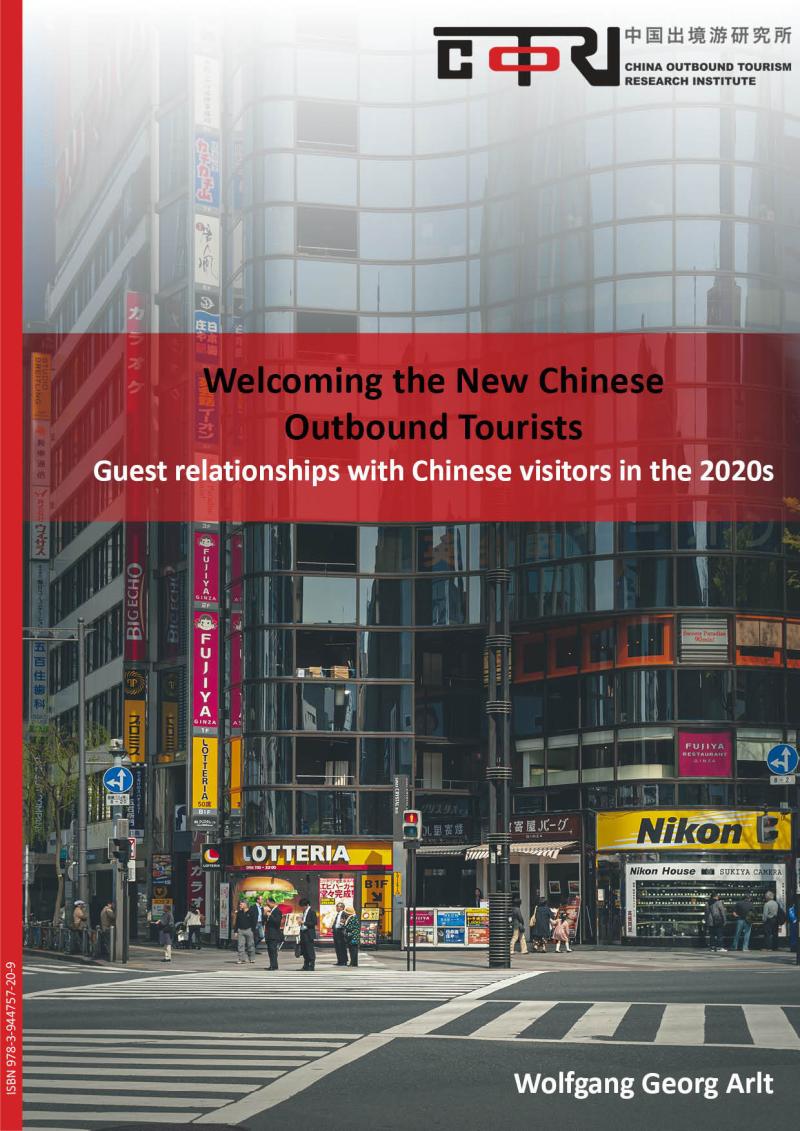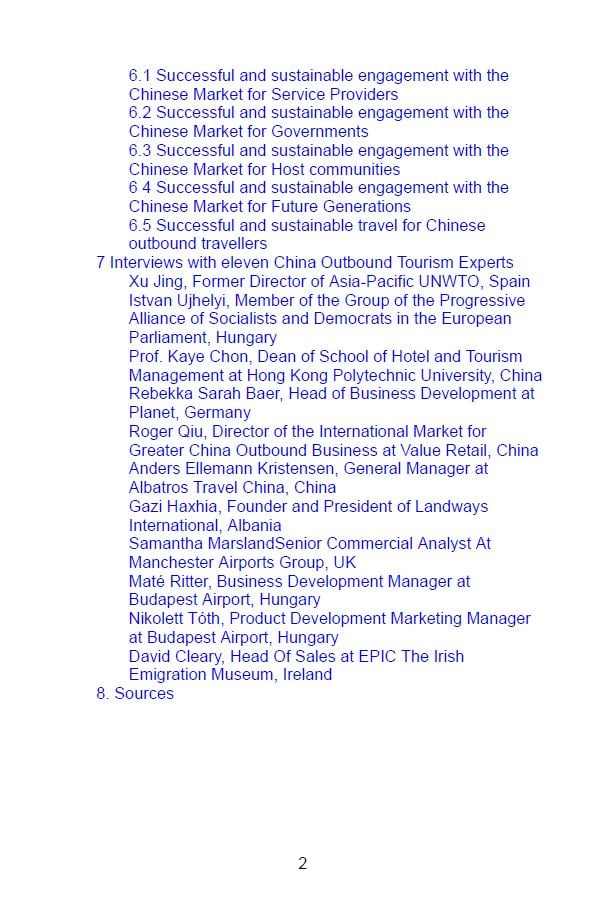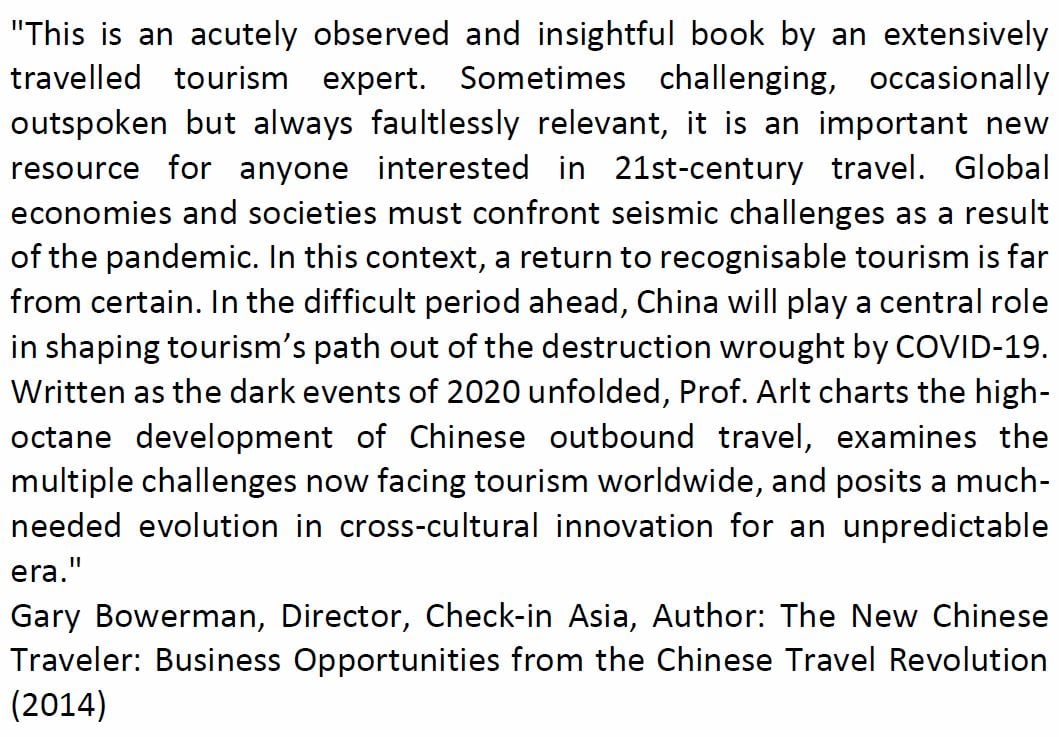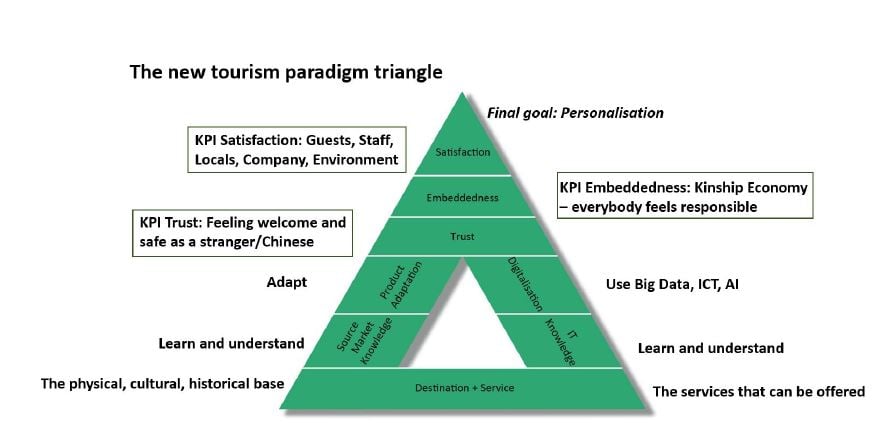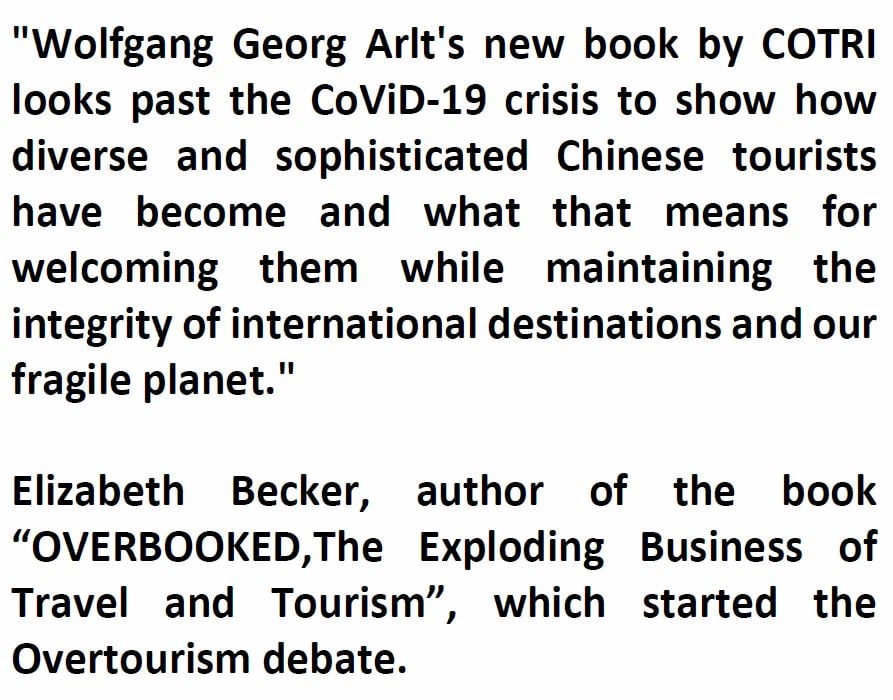Welcoming the New Chinese Outbound Tourists. Guest relationships with Chinese visitors in the 2020s
On Sale
€98.00
€98.00
Welcoming the New Chinese Outbound Tourists.
Guest relationships with Chinese visitors in the 2020s
Wolfgang Georg Arlt
ISBN 978-3-944757-20-9
Price: 98 Euro (incl. VAT)
eBook and pdf
"This is an acutely observed and insightful book by an extensively travelled tourism expert. Sometimes challenging, occasionally outspoken but always faultlessly relevant, it is an important new resource for anyone interested in 21st-century travel. Global economies and societies must confront seismic challenges as a result of the pandemic. In this context, a return to recognisable tourism is far from certain. In the difficult period ahead, China will play a central role in shaping tourism’s path out of the destruction wrought by COVID-19. Written as the dark events of 2020 unfolded, Prof. Arlt charts the high-octane development of Chinese outbound travel, examines the multiple challenges now facing tourism worldwide, and posits a much-needed evolution in cross-cultural innovation for an unpredictable era."
Gary Bowerman, Director, Check-in Asia, Author: The New Chinese Traveler: Business Opportunities from the Chinese Travel Revolution (2014)
Tourism post-CoViD-19 will have to move towards a new paradigm, adding levels of TRUST and SATISFACTION to the KPIs of destinations and tourism service providers. WOM² - Word of Mouth and Word of Mouse - recommendation marketing based on customer-focused product adaptation and digitalisation needs to gain more attention and government support instead of ineffective social media marketing.
This is especially the case for the Chinese outbound market, which was and will again be responsible for one out of eight international trips. Post-CoViD-19 Chinese travellers will choose their outbound destinations and activities more than ever according to their feeling of being truly welcome and of getting services and experiences tailor-made for their special interests, their families, and their cultural background.
The book aims to move towards a new paradigm for Chinese outbound tourism in the 2020s, helping global tourism and hospitality service providers to be more successful in the relation with Chinese visitors / guests / passengers / customers. The necessary shift from the previous, pre-CoViD-19 model is the change of the Key Performance Indicators from arrival numbers and margin to a sustainable and profitable business creating satisfied visitors, staff, and local population.
The book will discuss how we got to where we were before the virus in global and Chinese outbound tourism and what happened in the first half of 2020 as a reaction to the virus crisis both inside and outside China with regard to tourism. The book will also present some important examples of the discussions which took place in the first half of 2020 in all the papers, webinars and online conferences about tourism after the virus. Many times the need to create a vision for the new decade was left out in favour of the question of how to reach a “new normal”, which often looked very much like the old normal plus masks and disinfectants.
The core of the book are the provision of a number of tools for the development of a new mindset based on Trust, Embeddedness and Satisfaction as Key Elements of Guest-Host Relationships and of Digitalisation as a key tool. The goal has to be the development of a new paradigm for the global tourism but especially for China’s Outbound Tourism.
An actionable checklist for different stakeholders transforms the discussions and new approaches into concrete steps towards using the new paradigm for a satisfactory development in the new decade.
A separate, but important part of the book provides at the end an opportunity for eleven experts to have their say by each one answering the same questions about the future of tourism and especially of China’s outbound tourism from their respective perspectives, from politician to tour operator and from global to local player. They include Mr. Xu Jing, Former Director of Asia-Pacific UNWTO, Prof. Kaye Chon, Dean of School of Hotel and Tourism Management at Hong Kong Polytechnic University, and Mr. Istvan Ujhelyi, Chair of the Tourism Task Force in the European Parliament. Tour operators, cruise and aviation experts as well as payment and shopping experts from Asia and Europe.
The need for a paradigm shift has been seen long before CoViD-19 crippled the global tourism industry in 2020. The very success of international tourism, with five times the number of trips in 2019 compared to the year 1980, has made a mockery of the idea of hospitality (in German: Gastfreundschaft, friendship with guests) and has run a juggernaut over local nature, local culture, diversity and serendipity. Gigantic cruise ships, all-inclusive resorts, overcrowded beaches and disneyfied tourist cities are examples of forms of tourism organisation which practically prevent meaningful guest-host encounters.
Chinese outbound tourists have often been named as culprits for overtourism and a lack of interest in the destination on the one hand, and as “walking wallets” providing needed increases in arrivals and spending numbers on the other hand. Chinese travellers have more often than not felt that abroad their needs and demands were not taken sufficiently taken care of, whereas many staff members of hotels and tourism service providers as well as many locals ranked Chinese tourists among the least desirable.
Welcoming Chinese tourists by trying harder to understand them and to accept them in their diversity and by providing different levels of immersion into the destination with adequately adapted products should be the goal in the 2020s. Spending more on the satisfaction of the Chinese customers and less on often ineffective social media marketing will lead to highly effective recommendation marketing, increase the productivity of your staff and eliminate a source of possible tensions with the local population and administration.
Yes, for the next one or two years, sanitation and hygiene will require more attention and transparent communication to regain the trust of Chinese guests. However, the CoViD-19 virus and its effect of compelling everybody in the industry to rethink tourism provides an opportunity to change the way Chinese outbound tourism – and other tourism maybe as well – is organised in a win-win-win-win way for guests, hosts, companies and the planet.
Guest relationships with Chinese visitors in the 2020s
Wolfgang Georg Arlt
ISBN 978-3-944757-20-9
Price: 98 Euro (incl. VAT)
eBook and pdf
"This is an acutely observed and insightful book by an extensively travelled tourism expert. Sometimes challenging, occasionally outspoken but always faultlessly relevant, it is an important new resource for anyone interested in 21st-century travel. Global economies and societies must confront seismic challenges as a result of the pandemic. In this context, a return to recognisable tourism is far from certain. In the difficult period ahead, China will play a central role in shaping tourism’s path out of the destruction wrought by COVID-19. Written as the dark events of 2020 unfolded, Prof. Arlt charts the high-octane development of Chinese outbound travel, examines the multiple challenges now facing tourism worldwide, and posits a much-needed evolution in cross-cultural innovation for an unpredictable era."
Gary Bowerman, Director, Check-in Asia, Author: The New Chinese Traveler: Business Opportunities from the Chinese Travel Revolution (2014)
Tourism post-CoViD-19 will have to move towards a new paradigm, adding levels of TRUST and SATISFACTION to the KPIs of destinations and tourism service providers. WOM² - Word of Mouth and Word of Mouse - recommendation marketing based on customer-focused product adaptation and digitalisation needs to gain more attention and government support instead of ineffective social media marketing.
This is especially the case for the Chinese outbound market, which was and will again be responsible for one out of eight international trips. Post-CoViD-19 Chinese travellers will choose their outbound destinations and activities more than ever according to their feeling of being truly welcome and of getting services and experiences tailor-made for their special interests, their families, and their cultural background.
The book aims to move towards a new paradigm for Chinese outbound tourism in the 2020s, helping global tourism and hospitality service providers to be more successful in the relation with Chinese visitors / guests / passengers / customers. The necessary shift from the previous, pre-CoViD-19 model is the change of the Key Performance Indicators from arrival numbers and margin to a sustainable and profitable business creating satisfied visitors, staff, and local population.
The book will discuss how we got to where we were before the virus in global and Chinese outbound tourism and what happened in the first half of 2020 as a reaction to the virus crisis both inside and outside China with regard to tourism. The book will also present some important examples of the discussions which took place in the first half of 2020 in all the papers, webinars and online conferences about tourism after the virus. Many times the need to create a vision for the new decade was left out in favour of the question of how to reach a “new normal”, which often looked very much like the old normal plus masks and disinfectants.
The core of the book are the provision of a number of tools for the development of a new mindset based on Trust, Embeddedness and Satisfaction as Key Elements of Guest-Host Relationships and of Digitalisation as a key tool. The goal has to be the development of a new paradigm for the global tourism but especially for China’s Outbound Tourism.
An actionable checklist for different stakeholders transforms the discussions and new approaches into concrete steps towards using the new paradigm for a satisfactory development in the new decade.
A separate, but important part of the book provides at the end an opportunity for eleven experts to have their say by each one answering the same questions about the future of tourism and especially of China’s outbound tourism from their respective perspectives, from politician to tour operator and from global to local player. They include Mr. Xu Jing, Former Director of Asia-Pacific UNWTO, Prof. Kaye Chon, Dean of School of Hotel and Tourism Management at Hong Kong Polytechnic University, and Mr. Istvan Ujhelyi, Chair of the Tourism Task Force in the European Parliament. Tour operators, cruise and aviation experts as well as payment and shopping experts from Asia and Europe.
The need for a paradigm shift has been seen long before CoViD-19 crippled the global tourism industry in 2020. The very success of international tourism, with five times the number of trips in 2019 compared to the year 1980, has made a mockery of the idea of hospitality (in German: Gastfreundschaft, friendship with guests) and has run a juggernaut over local nature, local culture, diversity and serendipity. Gigantic cruise ships, all-inclusive resorts, overcrowded beaches and disneyfied tourist cities are examples of forms of tourism organisation which practically prevent meaningful guest-host encounters.
Chinese outbound tourists have often been named as culprits for overtourism and a lack of interest in the destination on the one hand, and as “walking wallets” providing needed increases in arrivals and spending numbers on the other hand. Chinese travellers have more often than not felt that abroad their needs and demands were not taken sufficiently taken care of, whereas many staff members of hotels and tourism service providers as well as many locals ranked Chinese tourists among the least desirable.
Welcoming Chinese tourists by trying harder to understand them and to accept them in their diversity and by providing different levels of immersion into the destination with adequately adapted products should be the goal in the 2020s. Spending more on the satisfaction of the Chinese customers and less on often ineffective social media marketing will lead to highly effective recommendation marketing, increase the productivity of your staff and eliminate a source of possible tensions with the local population and administration.
Yes, for the next one or two years, sanitation and hygiene will require more attention and transparent communication to regain the trust of Chinese guests. However, the CoViD-19 virus and its effect of compelling everybody in the industry to rethink tourism provides an opportunity to change the way Chinese outbound tourism – and other tourism maybe as well – is organised in a win-win-win-win way for guests, hosts, companies and the planet.

